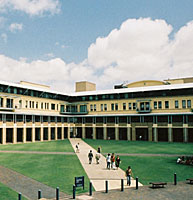| Biochemistry and Molecular Biology |
|
|||||||||||||||||||

Description Biochemistry is the study of molecules and chemical reactions that take place in all living organisms. Many of the recent advances in the life sciences have resulted from an amalgamation of biochemistry with molecular and genetic approaches. For example, biochemistry looks at reactions that turn food into energy, how DNA works to make us look the way we do, and how plants trap and use the energy of sunlight.
One of the most exciting areas of modern biochemistry is often referred to as "Molecular Biology". This area of biochemistry has contributed much to our understanding of how genes function by using the techniques of genetic engineering and DNA technology. Molecular Biology has made extensive contributions to the fields of medical DNA analysis, immunology, tissue transplantation, environmental monitoring and many other diverse areas affecting the daily life and health of all of us. It is a fundamental part of medical science and plays an increasingly important role in modern medical practice. Traditionally, biochemists have found work in hospitals, clinical and pathology labs, food and agricultural industries. While they are still employed in these areas, the recent explosion in molecular biology has spawned biotechnology-based industries which offer new opportunities for biochemistry graduates. Biotechnology industries, medical analysis laboratories, scientific and medical research, forensic science and bioinformatics are all possible areas of employment. Combining biochemistry and molecular biology with law or commerce also provides the potential to move into new fields such as patent law or policy making. Studying Biochemistry and Molecular Biology at UNSW The study of Biochemistry and Molecular Biology at UNSW is primarily through the School of Biotechnology and Biomolecular Sciences (www.babs.unsw.edu.au). At an undergraduate level, students can specialise in Biochemistry and Molecular Biology within the Bachelor of Science, the Bachelor of Science (Advanced Science) and the Bachelor of Medical Science programs. Please refer to the table below for related combined degree programs and opportunities for postgraduate study in this discipline.
|
||||||||||||||||||||

| Contacts | Library | myUNSW | WebCT |